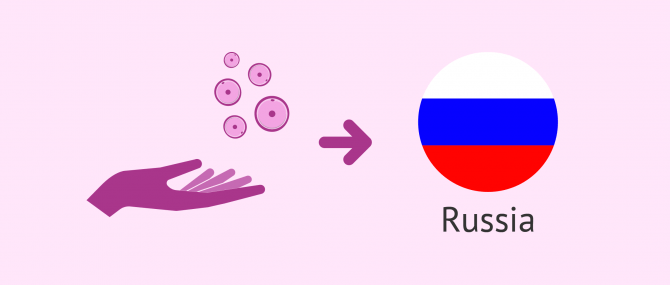Egg donation stands for a reproductive alternative that makes pregnancy possible for a great number of women who might not otherwise have access to motherhood with their own eggs.
Provided below is an index with the 4 points we are going to expand on in this article.
Laws on egg donation
Across European countries, Russia is included within the group in which gamete donation is allowed, among other fertility options. For this reason, Russia is one of the most common destinations of the so-called fertility tourism.
Russian law regulating assisted reproduction and hence also defines the conditions for egg donation and sperm donation is named "Federal law on public health protection", passed in November, 2011. Given that it stands for a strong and effective regulation, it is increasingly attracting patients from other European countries.
Below, some of the most important aspects concerning egg donation in Russia are explained.
Egg donor information
Two ways of proceeding when getting involved in the egg donation process exist and both are allowed on Russian territory: altruistic or commercial egg donation. According to the economic compensation given to donors, we will be talking about one type or another.
As for egg donor identity, recipients are allowed to choose between the following options as well:
- Anonymous donor: Egg donors are not given either general or personal information about the patients, and the patients will not have access to their donor's identity. Experts at the fertility center where you are doing the treatment will be responsible for acting as intermediaries and selecting the donor that best matches the recipient's characteristics.
- Known donor: In this case, intended parents can get to know the woman who is about to hand over her eggs for them. In fact, if this type of donation is chosen, the selected candidate must be someone close to the patients, either a relative or a friend.
With regard to anonymous egg donation, it should be clear than even though the intended parents cannot get confidential or personal information about the donor, they do have access to general data such as blood type, eye and hair color, weight, height, etc. In fact, there exist some egg donor agencies that make it available for them to hear audio notes and see childhood pictures of the donor.
Choosing the ideal prospective egg donor
Broadly speaking, egg donation processes are done taking into account that the donor remains anonymous. As a matter of fact, there are many fertility clinics that allow for just this alternative.
Since intended parents are not allowed to get identifying information about their donor, nor the donor can know about the recipient or couple who is about to receive her eggs, the donor is selected by the staff of the fertility clinic.
Even though donor identity and general information will never be offered to the receiving couple, they are indeed allowed to obtain general data about the woman who contributes her eggs for them. Some of the data that can be disclosed are:
- Blood type
- Rh factor
- Physical features such as eye color and shape, color and type of hair, skin tone, height, weight...
- Educational level
- Number of genetic children
- Date of birth
Also, some assisted reproduction clinics offer recipients the chance to see pictures of the genetic children their donor has already had. Russian regulations governing this allow neither donor agencies nor fertility clinics show pictures of the donor herself to the patient.
It should be taken into account that prospective egg donors who are finally accepted into the egg donation program should be aged 18 to 35 years, be already on motherhood, and pass a medical and psychological pre-screening that shows they actually enjoy good overall health.
Familial egg donation
Although the most common option is turning to anonymous egg donation, the Russian Law allows patients to meet the woman who will help them become parents through egg donation.
If the woman or couple who is about to follow donor-egg IVF wanted to meet their egg donor, there should be proof that she is a family member or close friend of the intended parents. Donor identity disclosure is not permitted is the is an unknown person.
As indicated earlier, donors have to pass a thorough medical screening in order for them to prove they actually enjoy good health and are able to donate their eggs. Family members or close friends to the intended parents who choose to contribute their gametes through non-anonymous egg donation should pass these tests as well if they want to continue being part of the program.
Among the different tests involved in the donor screening process, regardless of whether they are anonymous donor or family members, we highlight the following: screening of infectious diseases (hepatitis B and C, HIV, and syphilis), ultrasound monitoring, karyotype, urine cytology, psychological screening, etc.
Legal issues concerning egg donation
Egg donation becomes necessary when there are no chances of achieving reproductive success with a woman's own eggs. Problems related to ovarian reserve are among the most common causes that leave no alternative but to turn to egg donation.
The presence of any genetic alteration may lead a woman to use donor eggs as well.
When donor eggs are required, the only possible fertility treatment that can be performed is in vitro fertilization (IVF), given that artificial insemination is excluded in these cases.
In accordance to Russian regulations on this matter, only heterosexual couples and single women of legal age have access to assisted reproduction techniques, including egg donation.
As for the age limit, Russian law does not include any specific legislative provisions relating to it. However, only a few fertility clinics accept older-than-50 candidates.
As mentioned above, a great number of foreign patients travel to Russia in the pursuit of an IVF cycle using donor eggs, since Russian regulations governing egg donation places no restrictions regarding the patient's nationality or place of residence. Besides, the fact that all types of donation are allowed—i.e. anonymous, known, altruistic, and commercial donation—broadens the odds of achieving pregnancy, which at the same time turns Russia into a frequent tourist attraction.
We make a great effort to provide you with the highest quality information.
🙏 Please share this article if you liked it. 💜💜 You help us continue!




I actually don’t understand why artificial insemination is ruled out when using donor eggs… can you explain it to me? Because I’ve heard it’s cheaper and I’ve not much money to invest…
Hello,
Artificial insemination is the easiest fertility treatment because it consists of just placing the semen sample into the woman’s uterus. Conversely, when donor eggs are used, the recipient gets the eggs of another woman. Thus, follicular puncture becomes necessary; otherwise, there is no possible way to “insert” the donated eggs into the recipient woman’s womb. In such case, it is now the eggs of the donor which are inserted through embryo transfer (ET) but the embryos once fertilized. That’s why the only possible way to use donor eggs is via in vitro fertilization.
I hope I have clarified your doubts